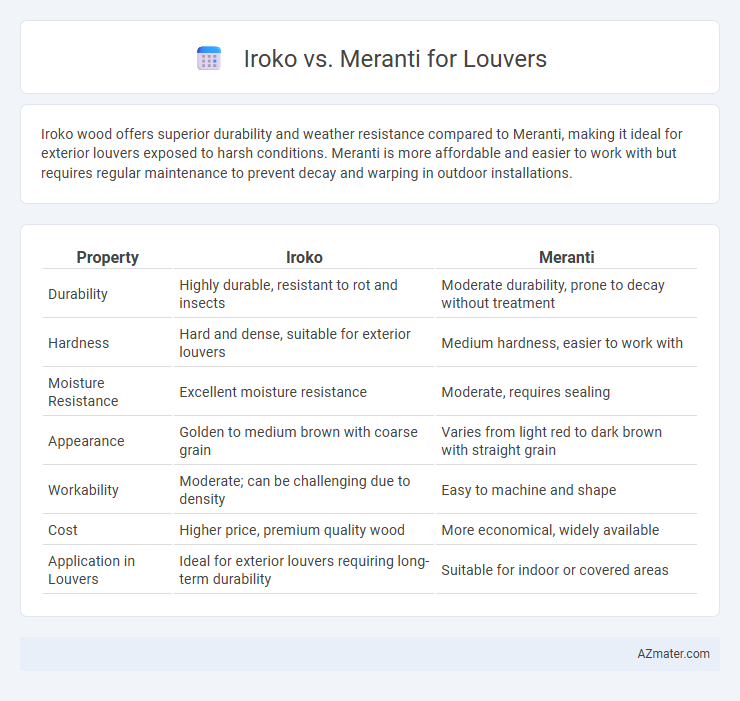Iroko wood offers superior durability and weather resistance compared to Meranti, making it ideal for exterior louvers exposed to harsh conditions. Meranti is more affordable and easier to work with but requires regular maintenance to prevent decay and warping in outdoor installations.
Table of Comparison
| Property | Iroko | Meranti |
|---|---|---|
| Durability | Highly durable, resistant to rot and insects | Moderate durability, prone to decay without treatment |
| Hardness | Hard and dense, suitable for exterior louvers | Medium hardness, easier to work with |
| Moisture Resistance | Excellent moisture resistance | Moderate, requires sealing |
| Appearance | Golden to medium brown with coarse grain | Varies from light red to dark brown with straight grain |
| Workability | Moderate; can be challenging due to density | Easy to machine and shape |
| Cost | Higher price, premium quality wood | More economical, widely available |
| Application in Louvers | Ideal for exterior louvers requiring long-term durability | Suitable for indoor or covered areas |
Introduction to Iroko and Meranti
Iroko and Meranti are popular hardwoods used extensively in louver construction due to their durability and resistance to moisture. Iroko, known as "African teak," offers exceptional strength, natural oils that repel water, and a golden to medium brown color ideal for outdoor applications. Meranti, sourced mainly from Southeast Asia, provides a lighter, reddish to pale brown hue and is prized for its ease of machining and affordability, making it a common choice for indoor louvers.
Botanical Origins and Species Overview
Iroko, derived from the Milicia excelsa tree native to tropical Africa, is a durable hardwood valued for outdoor applications including louvers, thanks to its high resistance to decay and insect attacks. Meranti encompasses several species within the Shorea genus found predominantly in Southeast Asia, offering a range of hardwood grades that vary in density and durability, commonly used in architectural elements like louvers for its workability and aesthetic appeal. Both Iroko and Meranti provide unique botanical characteristics; Iroko's dense grain and natural oils contrast with Meranti's lighter, more uniform texture, influencing their performance and finish in louver installations.
Physical Appearance and Color Differences
Iroko wood exhibits a golden to medium brown color that deepens with age, showcasing a coarse, interlocked grain pattern with a smooth texture ideal for louvers. Meranti ranges from pale pink to reddish-brown hues, often with a straight or slightly interlocked grain and a somewhat coarse texture, providing a warmer, more varied appearance. The distinct color stability and grain structure in Iroko offer a more uniform, natural look, while Meranti presents greater color variation, influencing aesthetic choices for louver applications.
Strength and Durability Comparison
Iroko wood exhibits superior strength and durability compared to Meranti, making it highly suitable for louvers exposed to harsh weather conditions. Its natural resistance to rot, insect attacks, and dimensional stability ensures long-lasting performance, surpassing Meranti which tends to degrade faster in humid environments. Iroko's Janka hardness rating of 1720 highlights its robustness, whereas Meranti averages around 980, reflecting a significant difference in wear resistance and structural integrity.
Weather Resistance and Outdoor Performance
Iroko wood offers superior weather resistance compared to Meranti, exhibiting excellent durability against moisture, UV exposure, and temperature fluctuations, making it ideal for outdoor louvers. Meranti, while commonly used for louvers, is less resistant to harsh weather conditions and may require regular maintenance to prevent warping and decay. Iroko's natural oils and dense grain enhance outdoor performance, providing long-lasting protection in tropical and temperate climates.
Workability and Ease of Fabrication
Iroko wood offers excellent workability and ease of fabrication due to its medium density and straight grain, making it suitable for precise louver cuts and machining tasks. Meranti, while softer and easier to shape, can present variability in grain that may cause uneven finishes during fabrication processes. Both woods respond well to common woodworking tools, but Iroko's consistent texture ensures smoother sanding and finishing for high-quality louver applications.
Maintenance Requirements for Louvers
Iroko wood requires minimal maintenance for louvers due to its natural resistance to rot, insects, and weathering, making it highly durable in outdoor conditions. Meranti, while affordable and easy to work with, needs more frequent sealing and treatment to prevent moisture damage and warping from prolonged exposure. Regular inspection and reapplication of protective coatings are essential for Meranti louvers to maintain structural integrity and appearance over time.
Cost and Availability
Iroko wood for louvers offers moderate cost efficiency with good availability in African regions, making it a durable yet cost-effective choice for outdoor applications. Meranti, sourced primarily from Southeast Asia, generally presents lower pricing but varies in grade and durability, impacting long-term maintenance expenses. Availability of Meranti is more widespread in global markets, while Iroko's limited regional supply can affect procurement timelines and price stability.
Environmental Impact and Sustainability
Iroko wood, harvested primarily from West Africa, is known for its durability and resistance to decay, making it a sustainable choice when sourced from certified plantations with managed harvesting practices. Meranti, commonly sourced from Southeast Asia, often faces scrutiny due to deforestation concerns and inconsistent certification, impacting its environmental footprint negatively. Choosing Iroko for louvers supports reduced ecological damage and promotes sustainable forestry compared to Meranti, which may contribute to biodiversity loss if not responsibly sourced.
Which Wood Is Better for Louvers?
Iroko offers superior durability and resistance to moisture and insects, making it an excellent choice for louver applications exposed to outdoor elements. Meranti, while more affordable and easier to work with, lacks the same level of weather resistance and may require more maintenance over time. For long-lasting louvers that withstand harsh climates, Iroko is generally considered the better wood option.

Infographic: Iroko vs Meranti for Louver
 azmater.com
azmater.com